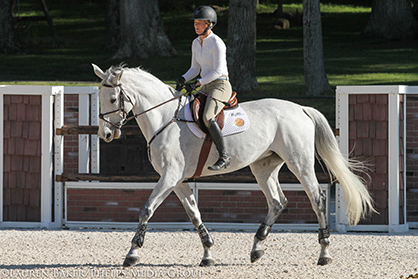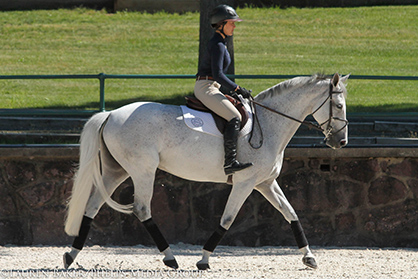George Morris, “Founding Father of Hunt Seat Equitation,” Instructs Riders in Riding Without Stirrups
PMG press release by: Lauren Baker
Gladstone, NJ – May 23, 2015 – George H. Morris arrived at Hamilton Farm, immediately found Janus Marquis and stated, “I want no stirrups today.” Thus, as eight saddles lost their stirrups, day five at the United States Equestrian Team Foundation’s “Gladstone Program” got underway.
Katie Cox, Lisa Goldman, Sean Leckie and Kilian McGrath rode into the arena at 8 a.m., where Morris awaited in his golf cart.
“Riding without stirrups is indispensable in that it produces a seat,” Morris explained as the riders walked. “The definition of a seat is the ability to stick to the horse no matter what the horse does.”
Morris instructed the riders to sit close to the front of the saddle in riding seat, which is one step before two point, or jumping seat. The riders practiced thinking forward to produce impulsion, making the horses straight and driving them up into the bit with their inside legs. Once the riders felt the horses moving energetically, they moved to the slow sitting trot, making sure to stay slightly in front of the center of the saddle.
Soon, riders alternated between sitting and posting, shoulder-in and haunches-in, later incorporating what Morris calls lateral schooling, which includes making figure eights and circles. These exercises help the horse become more responsive, encouraging the shoulders and hind end to move off the rider’s legs and hands.
The next step was incorporating transitions, which Morris said are “a concert of aids,” meaning the seat, back, legs and reins all play a part in a proper transition.
At the canter, riders practiced departing from the walk without any intermediate trot steps. They alternated leads every six strides, gradually working down to two strides at the walk before moving directly to the canter. Morris explained that this exercise greatly improves collection at the canter.
Katie Cox’s athletic horse Twilight was giving her a hard time, refusing to relax and swapping canter leads. Morris praised Cox for handling him so well, but wanted to hop on the horse himself, sans stirrups, to teach the gelding some respect for the aids. The hot-tempered gelding clearly has a sense of humor, because once Morris got a leg up, he refused to move into the trot.
“He’s a character,” Morris laughed. “I can’t make this horse trot! It’s water on a stone, people. Horses take patience, infinite patience. Wait for the horse.”
The grey horse eventually began to settle, but Morris switched over to schooling him on the lunge line, where the horse completely transformed.
“The lunge line is not my preference,” Morris explained. “But it is a great supplement to riding. I got off this horse because I was running out of gas, and you can’t let the horse feel that you’re weak, because then he thinks he has won.”
The other riders had already returned to the barn, and after Twilight was submissive to Morris’ commands, the lesson officially ended.
Haley Gassel, Kate Mulligan, Taylor Harris and Sophie Verges began their lesson at 10 a.m., walking with impulsion to warm up before moving to the sitting trot. The riders completed the same exercises as the first group, working on the lateral exercises before cantering directly from the walk and walking from the canter without any trot steps. To finish the lesson, Morris instructed the riders to hold their reins on the buckle and move the horses into an extended trot, letting the horses stretch.
Morris ended the session with his daily words of wisdom, saying, “If somebody says they know about this sport, run away from them. I’m 77 and I know nothing. I’m just starting to figure it out. You have to feel, and it takes years to feel. You have to be trained and the horse has to be trained.”
After the lessons were over, I had time to catch up with the ninth participant in the Gladstone Program, Bowers Cone. Due to a broken bone in his hand from a lacrosse injury, Cone is not riding and did not bring a horse, but nonetheless, is happy to be at Hamilton Farm.
“It’s an amazing experience,” Cone said. “It’s an honor being here. This building is 99 years old this year. There’s a lot of history here, and I’m psyched just to be here watching.”
Cone has ridden in two clinics with Morris in the past, but said he cannot get enough of learning about the gymnastics exercises and definitely will try them at home with his horse, VIP Quality Royale. After getting his cast off, the young rider plans to show at home in Memphis, Tennessee, before possibly heading to Tryon in June.
The Gladstone Program will continue Sunday morning, the final day, with riders jumping a full course at 8 a.m. and 10 a.m. Riding sessions are open to the public for auditing.
The United States Equestrian Team Foundation is the non-profit organization that supports the competition, training, coaching, travel and educational needs of America’s elite and developing international, high-performance horses and athletes in partnership with the United States Equestrian Federation.
For more information on the USET Foundation, please call (908) 234-1251, or visit USET ONLINE at www.uset.org.












